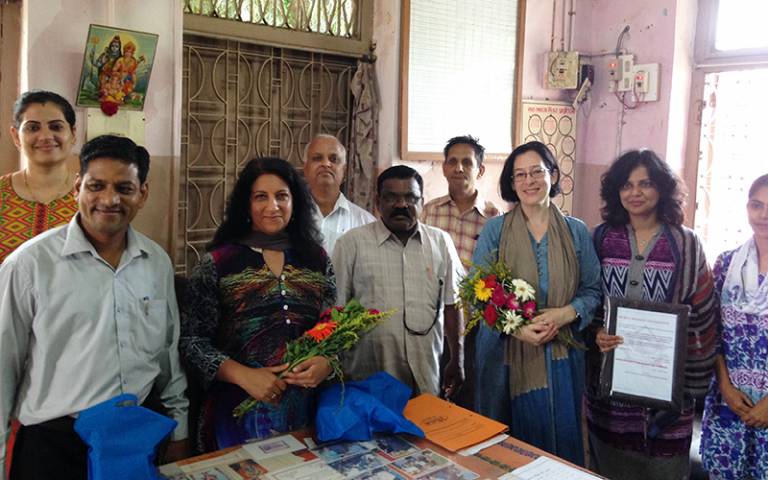UCL health collaborations in low and middle-income countries win Research Councils funding
6 January 2017
Three UCL international collaborations are among the first to receive Global Challenges Research Fund (GCRF) awards, in recognition of their world-leading research partnerships improving health in low and middle income countries.

The innovative partnerships optimising infant feeding practices in rural India, using technology to support HIV prevention in South Africa, and shaping future policies for the control of non-communicable diseases around the world, are among those taking home a share of more than £20m funding.
The interdisciplinary initiatives will be led by Professor Monica Lakhanpaul (UCL Great Ormond Street Institute for Child Health), Professor Rachel Anne McKendry (London Centre for Nanotechnology) and Professor Sarah Hawkes (UCL Institute for Global Health) respectively.
They are among 41 short-term projects across 39 UK research organisations to whom MRC, AHRC, BBSRC, ESRC and NERC are providing funding to work in partnership in 32 different countries.
New ways of working
Professor Lakhanpaul will work with Professor Marie Lall (UCL Institute of Education and Pro-Vice-Provost South Asia) and Dr Priti Parikh (UCL Department of Civil, Environmental & Geomatic Engineering) to develop an integrated health, education and environmental intervention to optimise infant feeding practices through schools and Anganwadi networks in India.
They will partner with Save The Children, Indian NGOs and village community members to co-design the intervention.
Professor McKendry's collaboration m-Africa will build mobile phone-connected diagnostics together with online care pathways to support HIV testing, management and prevention in decentralised settings.
The team brings together clinicians, scientists, engineers and public health researchers from UCL, Imperial College and the Africa Health Research Institute to deliver major health and economic benefits at the global epicentre of HIV.
Professor Hawkes' project will establish a network of policy analysts across Afghanistan, Bangladesh, Iran, Nepal, Pakistan, Tunisia and Vietnam. Together they will identify challenges and opportunities for promoting evidence-informed policies to address sugar, salt and trans-fats - products which are contributing to the rise in non-communicable diseases globally.
Strong foundations
Professor Lakhanpaul, Professor Lall and Dr Parikh's application for the funding came about following a UCL scoping visit to India led by Vice-Provost International Dame Nicola Brewer early last year. They recently returned from a follow up visit to the villages of Masar and Abhor in Gujarat, where they explored opportunities to work with not-for-profit Mukhul Madhav Foundation, one of the partners in the new project.
Professor Lakhanpaul said: "We are delighted to be receiving the award to support our research, which builds on the work I have been leading in the UK with the NIHR CLARCH (Collaboration for Leadership in Applied Health Research and Care) in Tower Hamlets.
"The current project crosses three faculties in UCL and strengthens our relationship with Save The Children, providing the opportunity to extend our partnerships in India. It is wonderful to have UCL's collaborative approach to partnership working recognised this way."
Professor Hawkes said: "Non-communicable diseases represent the largest threat to human health, including in low and middle income countries. UCL's global outlook has enabled us to promote collaborative international engagement with both old and new partners, to address the pernicious and persistent challenge of the commercial drivers of non-communicable diseases."
Ambitious research
The MRC Foundation Awards scheme is a collective initiative from the research councils under the £1.5bn Global Challenges Research Fund.
The awards have been allocated to support ambitious, novel and distinctive research in non-communicable diseases and infections, aiming to improve the health and prosperity of low and middle-income countries through harnessing the UK's research expertise.
New research awards in global agriculture and food systems (BBSRC-led) will be announced early in 2017.
Declan Mulkeen, the MRC's Chief of Strategy said: "The MRC has a strong track record in global health research, often in partnership. Infectious disease has been the main focus and remains the largest area of funding, but as countries develop, their health needs change. The Global Challenges Research Fund will enable us to tackle a broader range of health problems, for local and global benefit.
"These awards represent a significant win for global research. We hope that many of the research partnerships being supported will move on to even more ambitious work over the coming years."
 Close
Close

